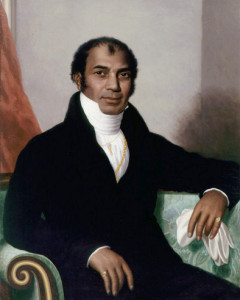I’m still having fun digging into The Epicure’s Almanack and have found another rather interesting rabbit hole to fall down. I think many of us know that in England “a curry” is the undisputed king of takeaway. It’s also (along with kebab) the top food sought out by late night drunks. So when I stumbled across information about the first Indian restaurant in England having been established in 1810, I had instantaneous visions of Regency rakes getting a curry after the theatre, perhaps with actresses in tow.
Now for the history part … Sake Deen Mahomet came to England in 1782, accompanying his friend Captain Godfrey Evan Baker when the captain retired from the British East India Company in which they had both served. He eloped with an Irish girl a few years later (over her family’s objections) and from all evidence the marriage was a great success. One of their sons was the proprietor of the Turkish baths at Brighton and ran a boxing and fencing academy there as well. A grandson went on to be an internationally famous physician! Those looking for a model for a non-Caucasian hero, take note!!! This guy and his descendants would be great models.
In 1794, Mahammad published The Travels of Dean Mahomet (a prime example of a book which Google has scanned but which is now unavailable, I assume because this annotated version from 1997 is in print).
In 1810, Mahomet opened the Hindoostanee Coffee House at no. 34 George Street (near Portman Square). They offered Indian cuisine, fine wines, and hookahs. Unfortunately, the restaurant does not appear to have been a great success, and it closed a couple years later. This is what The Epicure’s Almanack has to say about it:
“At the corner of George Street, there was until very lately an establishment on a novel plan. Mohammed, a native of Asia, opened a house for the purpose of giving dinners in the Hindustanee style, with other refreshments of the genus. All dishes were dressed with curry-powder, rice, Cayenne, and the best of Arabia. A room was set apart for smoking from hookahs with oriental herbs. The rooms were neatly fitted up en suite, and furnished with chairs and sofas made of bamboo canes.”
But fear not, by 1814 Mahomet and his wife were in Brighton, where they opened the first public “shampooing” bath in England (note: “shampooing was a type of massage and was conducted in a Turkish Bath-like steam room). Unlike his restaurant, his bathhouse was an enormous success (so much so that he was appointed as “shampooing surgeon” to George IV and William IV).
So bring it on, Regency authors! I want to see a private party at this establishment or one modeled after it. I want to see Anglo-Indian heroes. Are you with me, readers?


Mary Jo Putney has Anglo-Indian siblings as lead characters in books. There real people brought over as children of whom we rarely hear. One such child was involved in the case of the school teacher written up in the book/play etc The Children’s Hour. I think a university professor has been gathering information about such children. Thanks for the information about Dean Mahomet.
Yes, there were a lot of Anglo-Indian children sent home to England in the 18th and early 19th century with very little fuss from what I can tell. They were accepted and married as well as their fortunes would allow.
Love this idea!
On a semi-related note, I rewatched the Bollywood P&P, Bride and Prejudice, this weekend, and noted again that Naveen Andrews played the hottest Bingley character ever. He’d make a great hero model.
What a great article! I have had a hard time getting publishers interested in Multi-cultural heroes, but that hasn’t stopped me. One I’ve published is Spanish/English and one I’m working on is Chinese. I was once told there is no market for such…what about The King and I?
I’m Australian and married 25yrs to a Malaysian Chinese and we have three sons. Mixed marriages and relationships have been around a very long time.
xo
Thanks to my Turkish husband and some years spent in Turkey, I’ve used Turkish settings and characters in three Regency era historicals. One is published but ‘there is no market’ for the others. I feel heartened to read your article about the Mahomed family. Glad they prospered.
The hero of my second book is half Turkish (my college BFF is half Turkish and I love visiting his extended family in Istanbul). No one at Kensington every said a word about it, but the book is set in England.
Oh the possibilities! I have the Epicure’s Almanac, but I haven’t had the time to go through all of it. What a delightful idea and how wonderful and completely unsurprising the success of Dean Mahomed’s descendants.